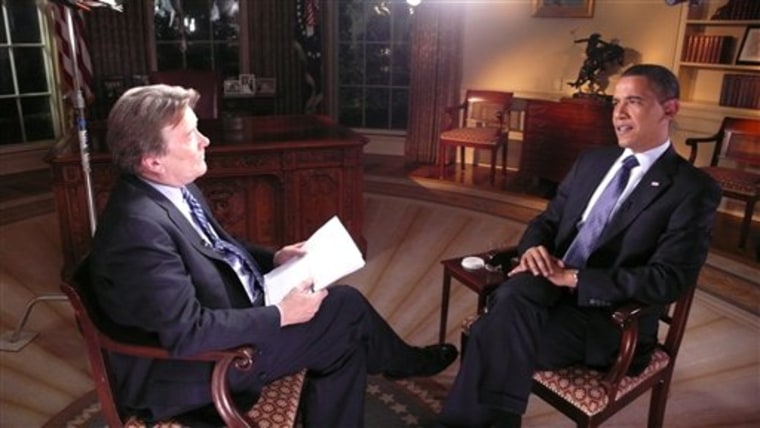President Barack Obama wagered significant political capital Sunday, signaling opposition to a highly popular congressional drive to slap a punitive 90 percent tax on bonuses to big earners at financial institutions already deeply in hock to taxpayers.
Obama defended his stance saying, “let's see if there are ways of doing this that are both legal, that are constitutional, that uphold our basic principles of fairness,” and that he would not "govern out of anger." He declared his determination, nevertheless, to make Wall Street understand it must shed "the old way of doing business."
In a wide-ranging interview broadcast Sunday night, Obama also acknowledged surprise at how quickly the U.S. economy crumbled between his November election and January inauguration.
"I don't think that we anticipated how steep the decline would be," he said in the interview on CBS' "60 Minutes." "That slope is a lot steeper than anything that we've said — we've seen before."
White House spokesman Robert Gibbs reiterated the president's position on Monday and added, "We will certainly evaluate whatever were to come down Pennsylvania Avenue."
Considerable political risk
There was considerable political risk attached to Obama's implied rejection of the 90 percent tax measure. It raced through the House last week as lawmakers responded to a wave of anger over bonus payments to American International Group Inc. employees.
A week ago, the company paid out at least $165 million in bonuses even though taxpayers were keeping the insurance giant afloat with a $170 billion government bailout.
While questioning the legality and constitutionality of the House measure, Obama said he expected the Senate would produce a much different and more acceptable version of the bill — one he could sign.
In a portion of the interview taped in the Oval Office, Obama issued his standard, optimistic long-term prognosis for the economy, but responded, "Yes," when asked if "the financial system could still implode if you had a big failure at AIG or at Citicorp?"
And the president explained that he felt caught in a balancing act, trying to assuage taxpayer anger at Wall Street with the need for support from the financial sector for his attempts to stop the country from plunging into fiscal turmoil.
"I think that you've got a pretty egregious situation here (bonus payments) that people are understandably upset about," he said in the interview taped Friday. "And so let's see if there are ways of doing this that are both legal, that are constitutional — that uphold our basic principles of fairness, but don't hamper us from getting the banking system back on track."
Earlier Sunday, Jared Bernstein, Vice President Joe Biden's economic adviser, previewed Obama's opposition to the AIG tax plan, saying it "may be a dangerous way to go."
Defends Geithner
And White House economic adviser Austen Goolsbee said his boss understood the nation's anger and that the easiest thing would be for AIG executives to return the bonuses. "He's going to look at what comes out of the House, what comes out of the Senate, see what ideas we have," Goolsbee said.
Obama used the CBS interview to yet again defend Treasury Secretary Timothy Geithner and his plans to resuscitate the ailing financial system.
Geithner was set on Monday to detail plans to use $100 billion in federal bailout funds to leverage as much as $1 trillion in so-called toxic assets off the books of endangered banks.
Meanwhile, Sen. Judd Gregg, R-N.H., predicted Obama's ambitious $3.6 trillion budget, including massive spending to save the economy, would put the country into bankruptcy and would never pass Congress.
"The practical implications of this is bankruptcy for the United States. There's no other way around it," Gregg said.
Gregg, however, joined Obama in defending Geithner and agreed with the president's apparent rejection of the House measure to tax bonuses.
"Let's not overreact in a way that basically has the Congress grabbing its pitchforks, and charging up the hill, and abusing what is a core authority of a government, which is the authority to tax its people," he said.
Bernstein spoke on ABC's "This Week." Goolsbee appeared on CBS' "Face the Nation." Romer spoke on "Fox News Sunday" and CNN's "State of the Union." Gregg appeared on CNN as well.
